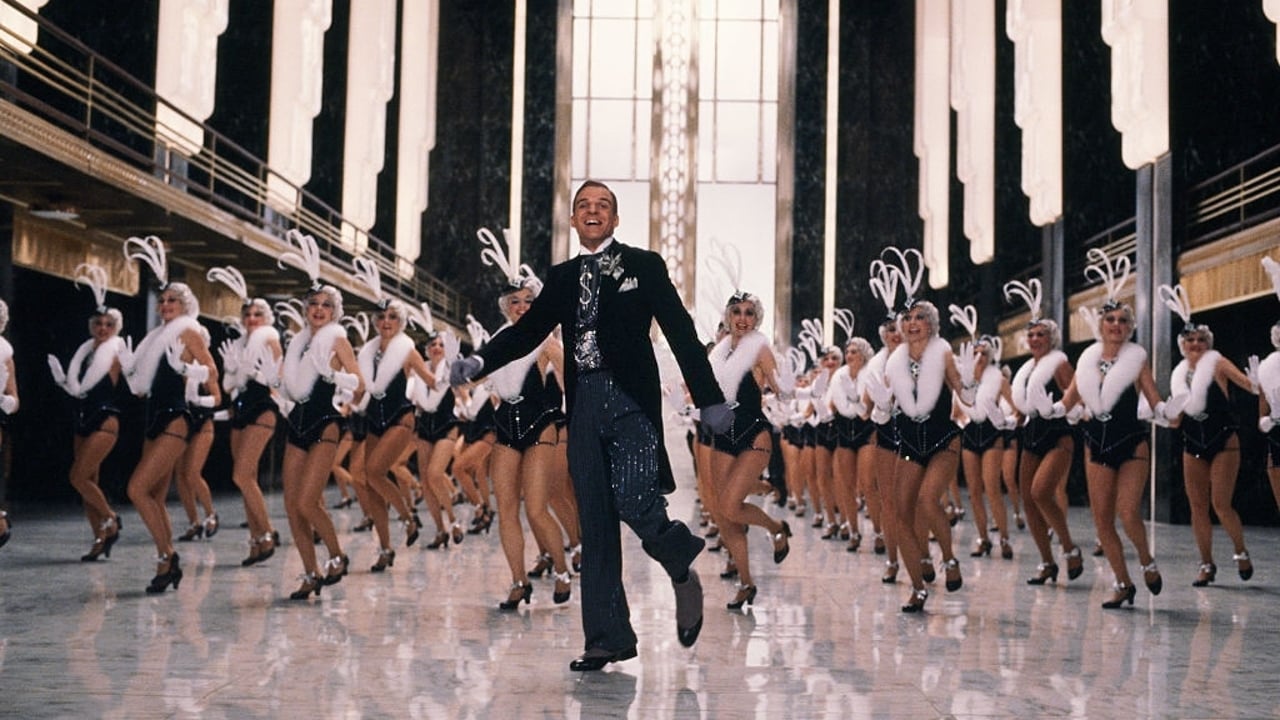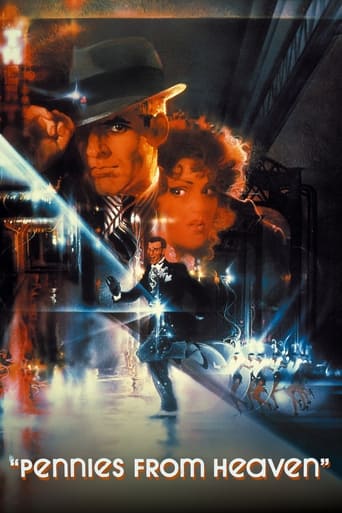

Steve Martin plays a disaffected traveling sheet music salesman. His wife is frigid and he wants more out of life. Soon he sees a pretty lady (Bernadette Peters), he is instantly smitten...though he has no idea who she even is. Can he win her or can his wife manage to be the woman he wants?I love old 1930s musicals, so you'd think I'd be the perfect person to watch "Pennies From Heaven". However, there were three major things that prevented me from falling in love with the film. First, when they weren't singing, the plot was so incredibly depressing and awful. Second, seeing modern actors dancing and lip syncing to old 1930s tunes is interesting...but soon loses its novelty and becomes a bit tiresome. Third, although the film is set in the mid-1930s, the cursing and crude language took me out of the experience. As a result, I had a hard time even finishing this film and I guess I am just the oddball who didn't appreciate the picture.
... View MoreWhat really got to me, while watching this great retro-musical, was this thought: why is it that the Anglo-American film-world manages to recycle the old musical classics again and again (right up to DANCER IN THE DARK and MOULIN ROUGE) while in Germany, for example, no self-respecting modern film maker would EVER dream of referring to any old German music film operetta? Sad. It explains why all those fantastic Hollywood musicals are alive and well, and present with the general audience. And why German operetta is all but forgotten. Sad indeed. - Perhaps one day German filmmakers will come up with something as wonderful as PENNIES FROM HEAVEN... it made me smile all the way through those Busby Berkely inspired numbers. And think of Sondheim's ASSASSINS at the very end.
... View MoreThis is a really ambitious film, but it's a failure. As many here have noted, it's a feature length film of a 7 hour British miniseries. Despite both being written (at least officially) by Dennis Potter, the brilliant TV writer, the movie feels essentially like a greatest hits package, taking the highlights of the miniseries, and making a film out of it. It plays almost like a 108 minute trailer. American moviegoers were majorly confused about it when it came out (it was a notorious bomb in its day), probably due to the use of pre-existing recordings mixed in with a dark, depressing story.There are some excellent things about it. It has great cinematography in it, the production design is eye boggling, and the film, despite the rushed atmosphere, manages to capture the mood and tone of the miniseries quite well. Martin, Peters, and Walken are good in their roles, but their British counterparts are better. Herbert Ross does the best he can here, and while the film is very ambitious and isn't a complete disaster, it's still not as good as the miniseries. Condensing a 7 hour TV film into a 2 hour one is never a good thing.
... View MoreThis takes place in 1934 Chicago. Sheet music salesman Arthur Parker (Steve Martin) hates his job and is married to a frigid unloving wife (Jessica Harper). He then meets naive unmarried Eileen (Bernadette Peters). Sex, rape, abortion, prostitution and murder follow. This is all pretty grim but, without warning, all the characters start lip syncing to cheerful songs from that era and musical numbers start. These numbers are very impressive and would make Busby Berkeley turn green with envy.This was (for 1981) a very odd idea for a big budget Hollywood movie. A bleak, depressing storyline full of unlikable characters is undercut by the cheerful music and dancing. This was released around Christmas as a holiday movie (a VERY bad idea) and was savaged by the critics and ignored by audiences. If this had been released at any other time of the year it might have been successful. Also this was years ahead of its time. I saw it twice when it came out. I was thoroughly depressed after each screening but fascinated too. There was nothing else like this at the time.The set design was VERY impressive. Some shots are recreations of famous paintings of that time-I recognized "Nighthawks" right away! The songs were great and they used the original recordings. They didn't transfer the songs to stereo either--they wanted them to sound like they did back then. The dances are just downright astounding. They're among some of the best I've ever seen. Christopher Walken stops the show by lip syncing (and tap dancing) to "Let's Misbehave".Casting Martin and Peters in this was a mistake. At this point neither were known for doing drama--Martin was a comedian and Peters just sang. Martin does OK in his role but Peters is pretty bad in hers. It doesn't destroy the movie it just lessens the impact. Harper is very good (although she's not in the movie much).So it's a depressing but a one of a kind movie. I give it an 8.
... View More